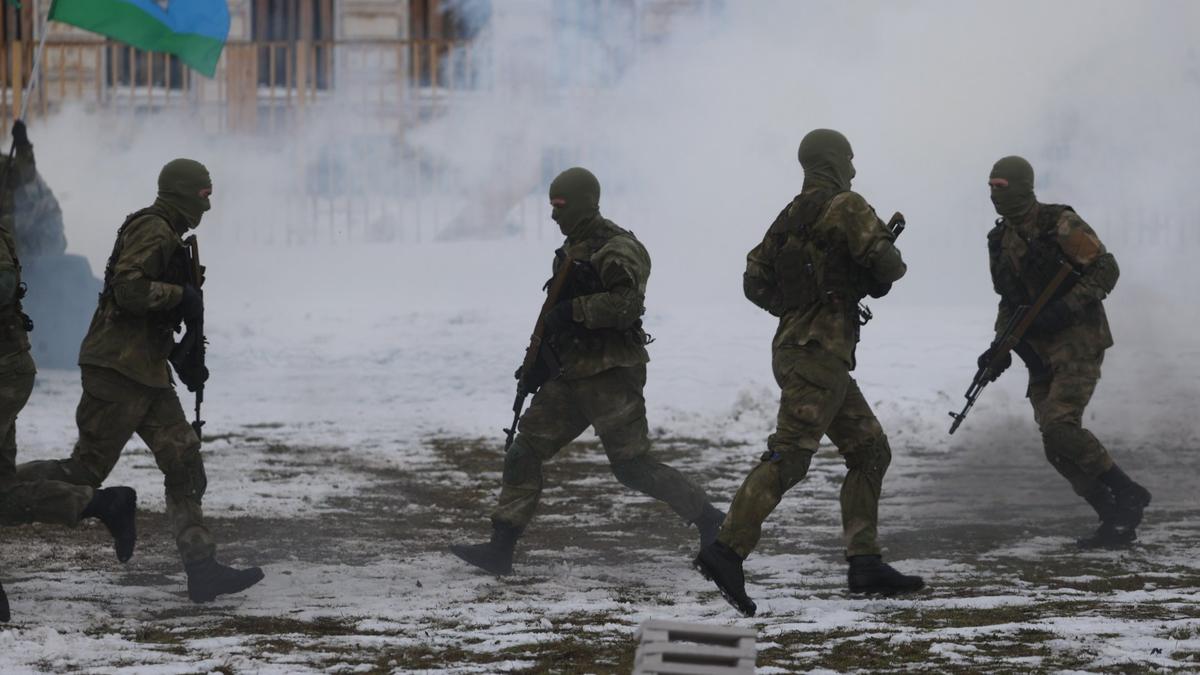In a recent article, Deutsche Welle claimed that GuardService, a private security firm in Belarus, might become the country’s equivalent to Russia’s PMC Wagner. Their source of information was Valery Sakhashchik, a former special forces officer. The article was titled Is a PMC Wagner clone being created in Belarus? (exactly this way, with the question mark). So far, though, GuardService looks more like a business project connected with big money and major Belarusian officials.
The Spetsnaz security firm
The special thing about the Belarusian “force market” is that the country never had privately-owned security firms. Any man wearing a uniform is the property of the state rather than some private company. This is strictly regulated by Belarusian laws.
Here is what the legislation says: only law enforcement agencies may be involved in security activities. The agencies include Lukashenka’s security department, the Defence Ministry, the Interior Ministry, the Emergency Ministry, the KGB, the State Border Committee, tax agencies, and the so-called State Control Committee. Additionally, the Belarusian Railways and the Department of Civil Aviation are allowed to have their freight escorted and guarded.
Some other ministries are also allowed to run paramilitary security staff. Those obviously do not include the Ministry of Culture or the Education Ministry, but rather those that have departments that may be involved with explosives. And that’s it. Private businessmen should remain on the margins and lay low.
Of course, private firms may have their own security teams to safeguard employees or facilities, but those are only allowed to work inside the company. Security as a commercial activity has always been banned in Belarus. However, the dream of private security companies (PSCs) providing a source of unlimited opportunities and money caused a great deal of interest among Belarusian security officials as early as in the 1990s.
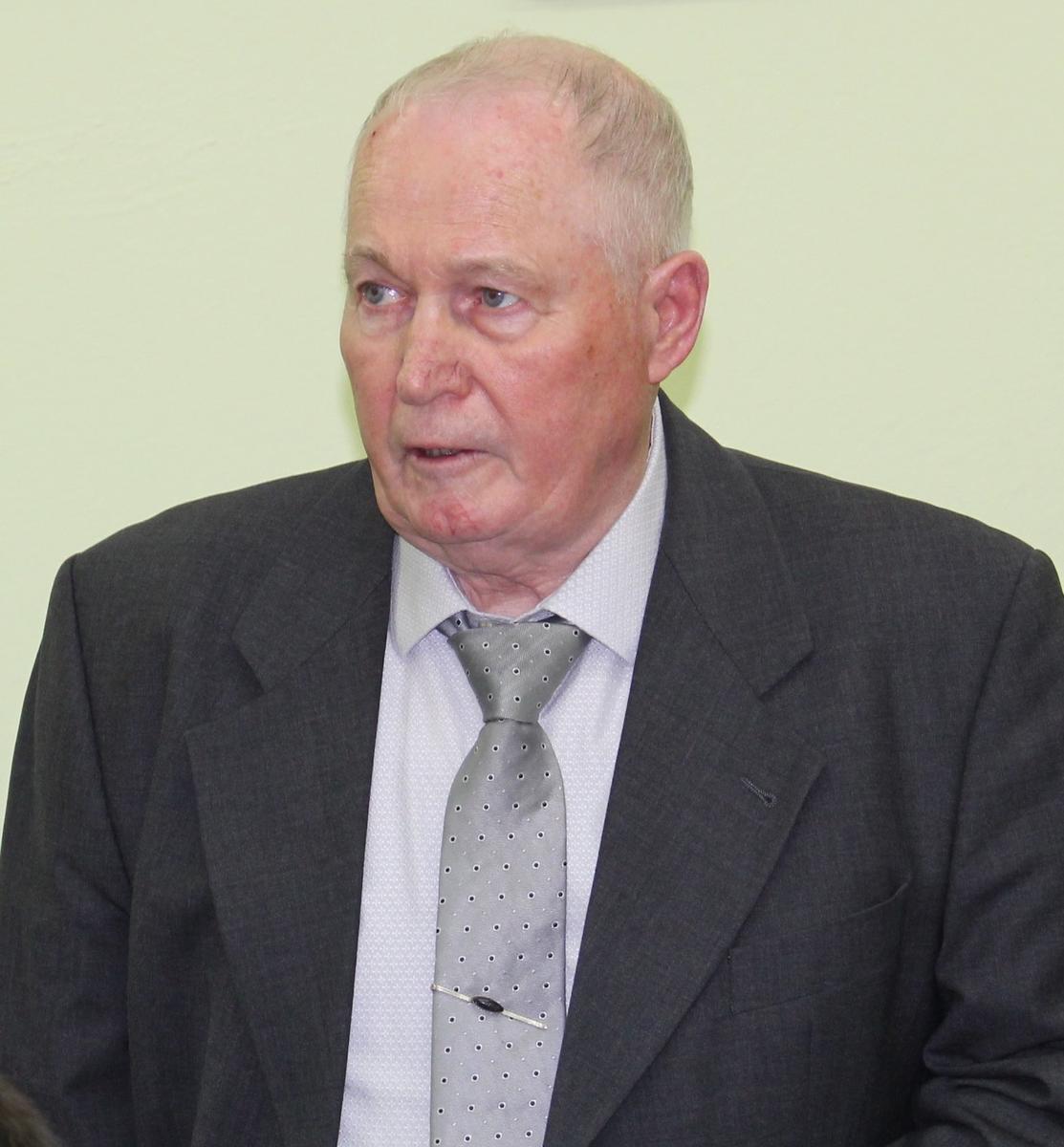
Yury Sivakov, the former Interior Minister of Belarus. Photo: Wikimedia
Yury Sivakov who worked as the commander of Belarusian Internal Troops, and then as the Interior Minister in the late 1990s, was willing to set up a PSC as a spin-off from the internal troops. First, he created a citizen group welcoming Spetsnaz (special forces — translator’s note) vets and called it The Honour. The plan was to recruit men from The Honour to the country’s first private security company. This project was, however, nipped in the bud by Uladzimir Navumau who worked as the commander of Almaz, an anti-terrorist special forces unit within the Interior Ministry, at the time.
The thing was that while being a Spetsnaz for the Interior Ministry and an anti-terrorist unit, Almaz used to operate as a de facto PSC already.
Its servicemen were hired unofficially to safeguard people or escort most valuable freight and were paid in cash.
It was quite a profitable business both for Navumau and the Almaz unit, and they never wanted to share this pie with the Internal Troops.
Apparently, that was the moment when Sivakov and Navumau became adversaries. Instead of setting up a PSC, Sivakov created a division of Spetsnaz within the internal troops a.k.a. SOBR, notorious for being involved in kidnappings of Lukashenka’s political rivals. This division started to compete with Almaz and eventually pushed it off to the margins.
Uladzimir Navumau took over Sivakov’s position of Interior Minister in the early 2000s by a twist of fate, and then, by even a more ironic twist of fate, both made it to the first EU and US sanctions list for being involved in assassinations of opposition politicians.
There were two more names on the list: Dmitry Pavlichenko, the commander of the same unit that gave birth to the “death squadron” instead of the first Belarusian PSC, and Viktor Sheiman, the former Secretary of the Security Council and Prosecutor General, directly connected with the infamous GuardService company.
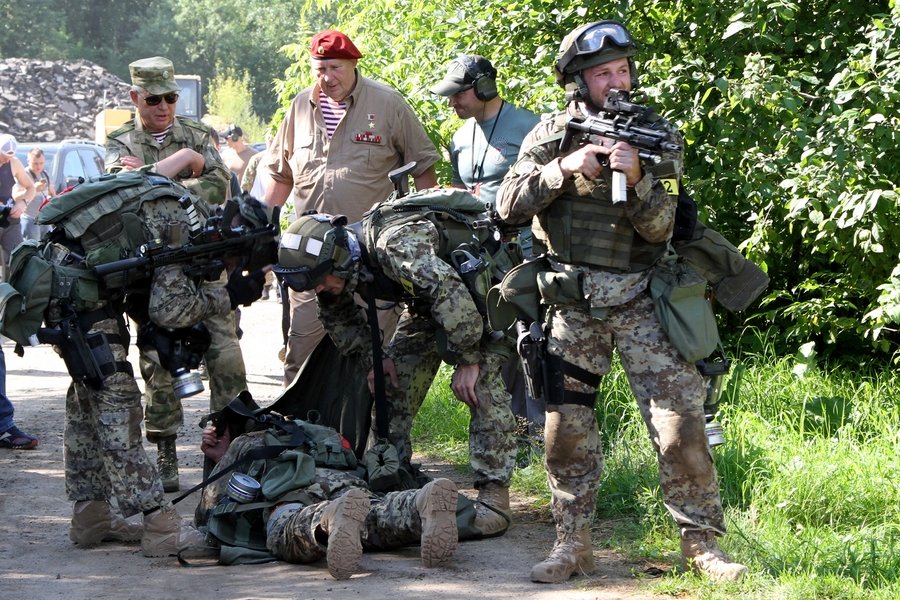
The Almaz servicemen. Photo: Belarus Today
Sweet child of smuggling
GuardService first appeared in the Belarusian media in June 2020. This happened on 18 June, after Viktar Babaryka, the most popular candidate for president, got arrested, but before the mass protests that followed the presidential election, when Lukashenka’s decree “On security services” was published. The decree read that GuardService was allowed to provide security services, exclusively run by state agencies before: to guard facilities, to transport and guard property, and to escort freight and vehicles.
More importantly, GuardService was allowed to acquire, store, and equip its staff with service firearms and ammo. Its employees have the right to use weapons, special equipment, and physical force. This news caused an obvious reaction: Lukashenka is so scared before 9 August [the election day], people said, that he is ready to hand out weapons to civilians, create private security companies run by reliable people, and set up armed guards that are not controlled by state structures and might as well betray him.
By the way, no one has yet found out whether there were employees of PSC GuardService among the numerous guys wearing balaclavas who crushed protesters’ ribs back then.
According to kartoteka.by, a contractors database, the founder and owner of GuardService is Globalcustom, a company of equal notoriety.
This company was mentioned in an investigation made by RBC in 2017 about the scheme of smuggling European sanctioned goods into Russia.
Globalcustom was involved in replacing labels stating origin country on packages of sanctioned goods which then were imported by Russia as if they were from Belarus, a fellow Eurasian Economic Union member state.
After the investigation had been published by RBC, Globalcustom issued a statement that denied the allegations. However, even the official website of Rosselkhoznadzor, Russia’s federal service overseeing agricultural produce, mentions Globalcustom in connection with using forged accompanying documents.
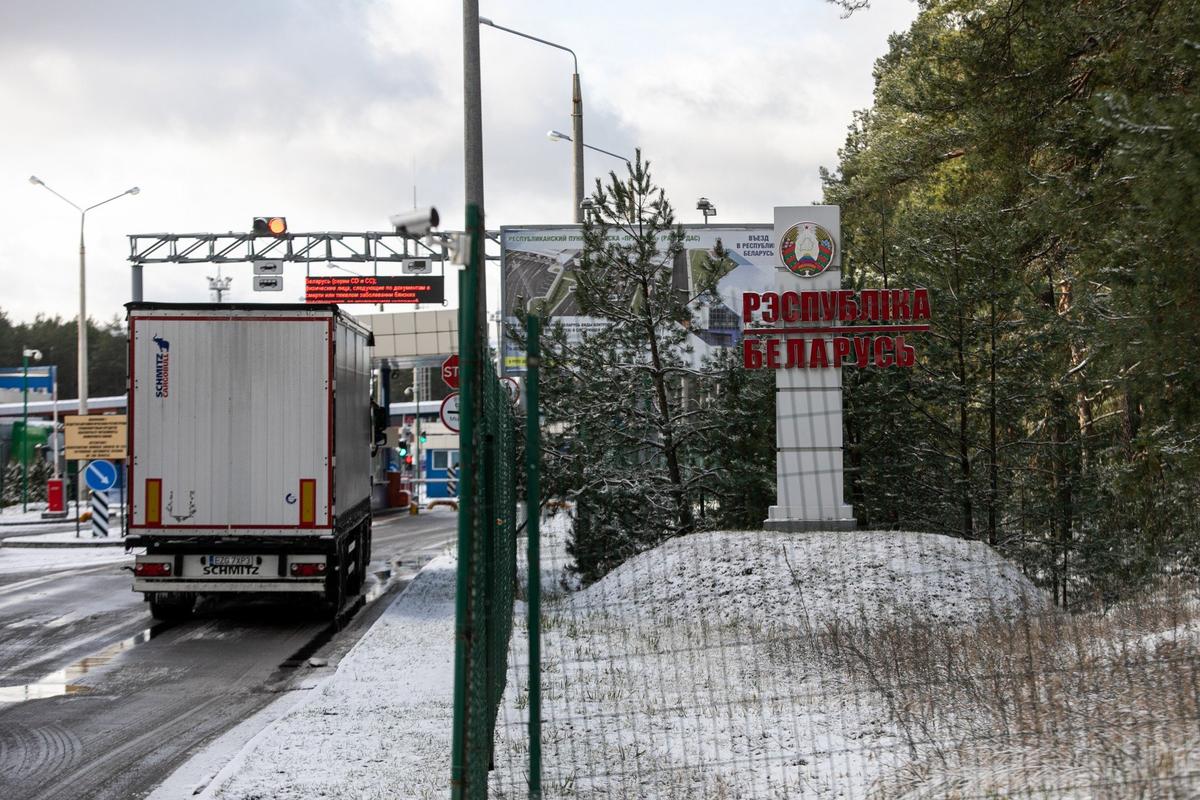
A checkpoint at the border between Belarus and Lithuania. Photo: Paulius Peleckis / Getty Images
Curiously enough, the company received a license to trade fruits and vegetables in 2018 after all the revelations of Rosselkhoznadzor and the RBC investigation.
It set up a company in November 2019 that was renamed GuardService two months later. And if it wasn’t for Lukashenka’s special decree of June 2020 which allowed possession and use of weapons for private security services, no one would have paid attention to this new business entity. But thanks to the weapons and the founder that blew its cover while smuggling sanctioned commodities earlier, there was no way GuardService could have stayed unnoticed.
Yevgeny Chanov, a former officer of the 5th Special Forces Brigade of the Belarusian Armed Forces, became the director of the first Belarusian private security company. He worked as the director of security for Belgeopoisk, a company involved in gold mining in Zimbabwe and other African countries, during the same period. Thanks to the Pandora Papers, an international journalist investigation that took two years and 600 people from 150 media outlets to finish, it was revealed that it was Viktor Sheiman (who worked as the Secretary of the Security Council, the Prosecutor General under Lukashenka, despite having no degree in law, and the executive manager simultaneously) who signed a contract with the Zimbabwean leadership to establish a joint gold mining company Zim Goldfields in 2018.
His son Sergey and businessman Alexander Zingman, the honorary consul of Zimbabwe in Belarus, established the Midlands Goldfields Foundation in the Seychelles a while earlier. According to the Pandora papers, it is Sheiman and his son who are the main beneficiaries of gold mining in Zimbabwe. Sheiman could possibly need his own unit of reliable armed people to protect facilities in Zimbabwe, Sudan or Venezuela, which he had visited for many years to “develop economic cooperation” — be it a PSC or a PMC, a private military company.
By the way, Yevgeny Chanov has an amusing hobby: he draws portraits of Russian celebrities and posts them on social media — to everyone’s delight, of course.
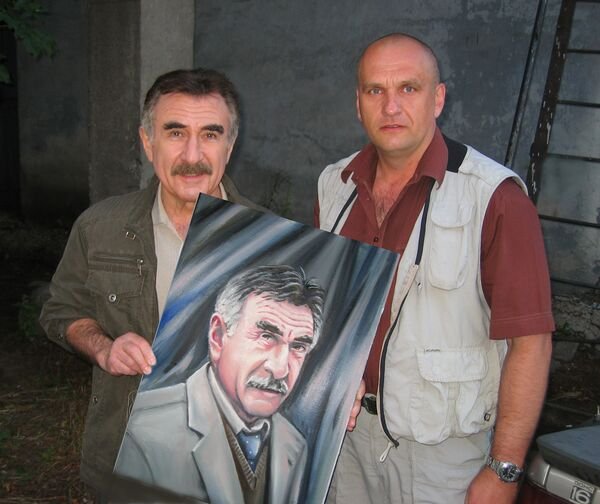
Yevgeny Chanov gifts a portrait to Leonid Kanevsky, a Russian TV host and film actor. Photo: social media
A PSC is not yet a PMC
Belarusians were quite busy in August 2020 to notice the changes in the charter of a random private security company despite Lukashenka himself granting the entity the right to use weapons. It was then that the company changed its owner, director, and business address.
From then on, GuardService moved to the same address where the Centre for Special Training had been stationed prior to that. Its chairman Andrey Krasovsky gave an interview for a state-owned media outlet called SB Belarus Today in 2013, explaining that the agency top priority is to provide special, fire, and physical training to employees and military personnel of state bodies. Foreign military personnel from Africa, the Middle East, Central America, and Asia also trained there.
However, the well-equipped depot was given away to GuardService. This is a clear sign that high-ranking Belarusian officials have big plans for this firm.

Alexander Metla, a veteran of the Soviet–Afghan War. Photo: Belarus Today
The company got a new director in Vladimir Orekh, a retired colonel, and a new owner, Alexander Metla, a close friend of Viktor Sheiman’s, in August 2020. This friendship can be traced back to Afghanistan as both fought in the Soviet–Afghan War in the mid-1980s.
Viktor Sheiman later became an MP and, after the first presidential election, the secretary of the Security Council, as well as the de facto second man in the country and Lukashenka’s confidant in all non-public areas.
Today, the GuardService private security company has a registration, business address, a depot, a director, but does not even have its own website despite declaring that it makes money by guarding. This means that security services for companies and individuals are still not its main profile of activity.
I managed to have a brief conversation with one of GuardService’s employees. He scoffed at my theory that the PSC might turn into a PMC, advised me not to look for a black cat in a dark room and ensured me it was plain business rather than politics. He told me one more thing: GuardService has been working smoothly since 2019, from the moment it was registered, and is currently engaged in protecting the facilities of Lukashenka’s administration, and will potentially start making money soon by guarding the administration’s assets in Zimbabwe, Sudan, Venezuela, and other countries, while the firm’s foundation has nothing to do with the 2020 election, and even more so with the war.
This appears to make sense, especially since everyone who spoke and wrote about the creation of a PMC based on GuardService referred to only one person, a former Spetsnaz officer Valery Sakhashchik who now lives in Poland, runs a construction business, and recently joined Sviatlana Tsikhanouskaya’s office as an adviser on defence and security issues. However, he is a source as reliable as ice in the spring.

Valery Sakhashchik. Photo: Belarus Today
When Sakhashchik entered Tsikhanouskaya’s circle, the pro-government media immediately claimed he had a Russian passport. The brigade commander reacted in a sly manner. First he said that he remembered nothing about it and that he received the passport by mail (any Russian national has every right to say that there is no believing a person who lies as clumsily as this). Then he admitted having the passport but claimed he was not using it. And finally, he explained himself by stating that it was simply easier to travel to the Middle East with a Russian passport. By the way, the passport was issued in Kaliningrad.
Sakhashchik’s construction company has a profile on VK which posted a picture on 21 April 2021, captioned this way: “With this gang we have been constructing things in Belarus, Russia, and the UAE, since 2007: from an FSB college building in Kaliningrad to vacation homes for sheikhs of Abu Dhabi and Dubai.” A contract for the FSB is one more reason Belarusians do not consider Valery Sakhashchik a reliable insider.
Support independent journalism
Dura lex
By the way, no one has ever investigated the legal side of this issue. It makes sense, obviously, as it would be the same as analysing the activities of a “death squadron” regarding their compliance with the Constitution. Nevertheless, if you still approach it formally, you will find out that Alyaksandar Lukashenka retroactively legalised the activities of GuardService by signing the law “On Licencing” on 14 October 2022. Now security services are a legal type of business activity that requires obtaining a licence.
Thus, GuardService is now a private company licenced to provide services for the protection of individuals and their property, as well as various facilities from criminal or other illegal encroachments, with the legal permission to use civilian and service weapons in their activities.
A service weapon differs from a combat weapon: it may only be used to shoot single bullets, and not rounds. Its chamber size is also different, and its stock can fit no more than 10 bullets.
In other words, GuardService is not a paramilitary organization, and it may not possess and use artillery weapons systems, armoured combat vehicles, automatic firearms, medium and large calibre firearms, as well as explosives.
According to a decree by the Interior Ministry dated 22 March 2021, GuardService employees are allowed to have pistols and revolvers, hunting rifles and signal pistols, stun guns and tear gas sprayers. However, any attempt to change the company’s profile from a security company to a paramilitary structure, a wannabe military unit, and even more so setting combat missions, is, in accordance with Belarusian laws, a grave crime (from recruiting mercenaries to creating an illegal armed formation).
It has to be said, though, that in September 2020, Lukashenka stated that “there are times when there are other things to worry about besides the law”. Since then, this phrase has replaced every legal document in the country, from the Constitution to the latest ministerial decree.
So, GuardService is a security company of dubious origin, owned by “Afghanistan guys” and supervised by Viktor Sheiman. To date, nothing indicates that it might eventually turn into a paramilitary. Except for one thing: PMC Wagner was originally set up to simply guard oil pipes in Syria, and not execute combat missions. It did, however, expand fast to other countries and even continents, blasting its guns like crazy.
Join us in rebuilding Novaya Gazeta Europe
The Russian government has banned independent media. We were forced to leave our country in order to keep doing our job, telling our readers about what is going on Russia, Ukraine and Europe.
We will continue fighting against warfare and dictatorship. We believe that freedom of speech is the most efficient antidote against tyranny. Support us financially to help us fight for peace and freedom.
By clicking the Support button, you agree to the processing of your personal data.
To cancel a regular donation, please write to [email protected]
